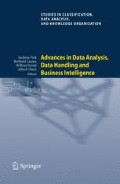Abstract
This paper is concerned with the types of models researchers use to analyze empirical data in the domain of social judgments and decisions. Models for the analysis of judgment data may be divided into two classes depending on the criteria they optimize: Optimizing an internal (mathematical) criterion function with the aim to minimize the discrepancy of values predicted by the model from obtained data or incorporating a substantive underlying theory into the model where model parameters are not only formally defined, but represent specified components of judgments. Results from applying models from both classes to empirical data exhibit considerable differences between the models in construct validity, but not in empirical validity. It may be concluded that any model for the analysis of judgment data implies the selection of a formal theory about judgments. Hence, optimizing a mathematical criterion function does not induce a non-theoretical rationale or neutral tool. As a consequence, models satisfying construct validity seem superior in the domain of judgments and decisions.
Access this chapter
Tax calculation will be finalised at checkout
Purchases are for personal use only
Preview
Unable to display preview. Download preview PDF.
References
Anderson, N. H. (1981). Foundations of information integration theory. New York: Academic Press.
Anderson, C. A., & Sedikides, C. (1991). Thinking about people: Contributions of a typological alternative to associationistic and dimensional models of person perception. Journal of Personality and Social Psychology, 60, 203–217.
Apostel, L. (1961). Toward the formal study of models in the non-formal sciences. In B. H. Kazemier, & S. Vuysje (Eds.), The concept and the role of the model in mathematics and natural and social sciences (pp. 1–38). Dordrecht: Reidel.
Bröder, A. (2002). Take the best, Dawes’ rule, and compensatory decision strategies: A regression-based classification method. Quality and Quantity, 36, 219–238.
Claudy, J. G. (1972). A comparison of five variable weighting procedures. Educational and Psychological Measurement, 32, 311–322.
Dana, J., & Dawes, R. M. (2004). The superiority of simple alternatives to regression for social science predictions. Journal of Educational and Behavioral Statistics, 29, 317–331.
Dawes, R. M., & Corrigan, B. (1974). Linear models in decision making. Psychological Bulletin, 81, 95–106.
Einhorn, H. J., & Hogarth, R. M. (1975). Unit weighting schemes for decision making. Organizational Behavior and Human Performance, 13, 171–192.
Fischer, G. H. (1996). IRT-Modelle als Forschungsinstrumente der Differentiellen Psychologie. In K. Pawlik (Ed.), Grundlagen und Methoden der Differentiellen Psychologie (pp. 673–729). Göttingen: Hogrefe.
Fiske, S. T., & Taylor, S. E. (2008). Social cognition. From brains to culture. Boston: McGraw-Hill.
Gigerenzer, G., & Todd, P. M. (1999). Simple heuristics that make us smart. New York: Oxford University Press.
Hamilton, D. L., & Gifford, R. K. (1976). Illusory correlation in interpersonal perception: A cognitive basis of stereotypic judgments. Journal of Experimental Social Psychology, 12, 392–407.
Harshman, R. A. (1984). How can I know if it’s real. In H. G. Law, C. W. Snyder, J. A. Hattie, & R. P. McDonald (Eds.), Research methods for multimode data analysis (pp. 566–591). New York: Praeger.
Krolak-Schwerdt, S. (2005). A three-way multidimensional scaling approach to the analysis of judgments about persons. In C. Weihs, & W. Gaul (Eds.), Studies in classification, data analysis, and knowledge organization, Classification: The ubiquitous challenge (Vol. 27, pp. 264–271). Berlin: Springer.
Roskam, J. J. (1979). The nature of data: Interpretation and representation. In J. C. Lingoes, E. E. Roskam, & I. Borg (Eds.), Geometric representation of relational data. Ann Arbor: Mathesis Press.
Schmidt, F. L. (1972). The reliability of differences between linear regression weights in applied differential psychology. Educational and Psychological Measurement, 32, 879–886.
Stewart, T. R. (1988). Judgment analysis: Procedures. In B. Brehmer, & C. R. B. Joyce (Eds.), Human judgment: The SJT view (pp. 41–74). Amsterdam: North Holland.
Tucker, L. R. (1972). Relations between multidimensional scaling and three-mode factor analysis. Psychometrika, 37, 3–27.
Wainer, H. (1976). Estimating coefficients in linear models: It don’t make no nevermind. Psychological Bulletin, 83, 213–217.
Author information
Authors and Affiliations
Corresponding author
Editor information
Editors and Affiliations
Rights and permissions
Copyright information
© 2009 Springer-Verlag Berlin Heidelberg
About this paper
Cite this paper
Krolak-Schwerdt, S. (2009). Strategies of Model Construction for the Analysis of Judgment Data. In: Fink, A., Lausen, B., Seidel, W., Ultsch, A. (eds) Advances in Data Analysis, Data Handling and Business Intelligence. Studies in Classification, Data Analysis, and Knowledge Organization. Springer, Berlin, Heidelberg. https://doi.org/10.1007/978-3-642-01044-6_2
Download citation
DOI: https://doi.org/10.1007/978-3-642-01044-6_2
Published:
Publisher Name: Springer, Berlin, Heidelberg
Print ISBN: 978-3-642-01043-9
Online ISBN: 978-3-642-01044-6
eBook Packages: Mathematics and StatisticsMathematics and Statistics (R0)

